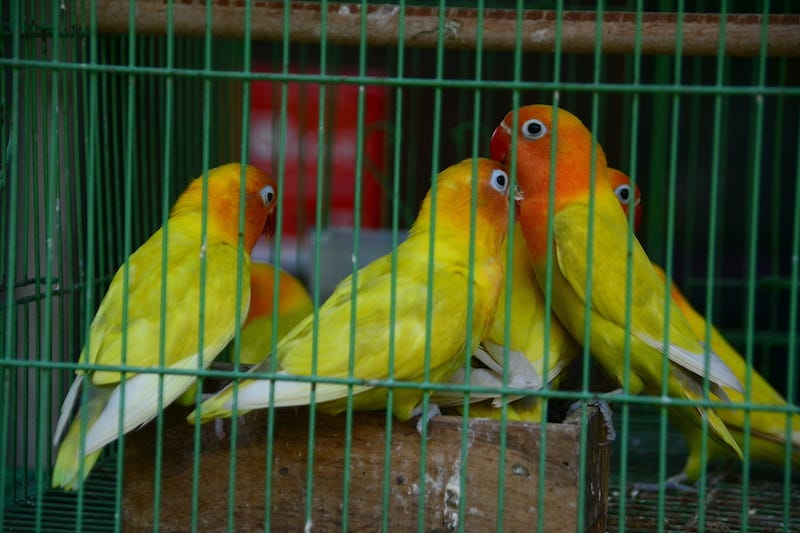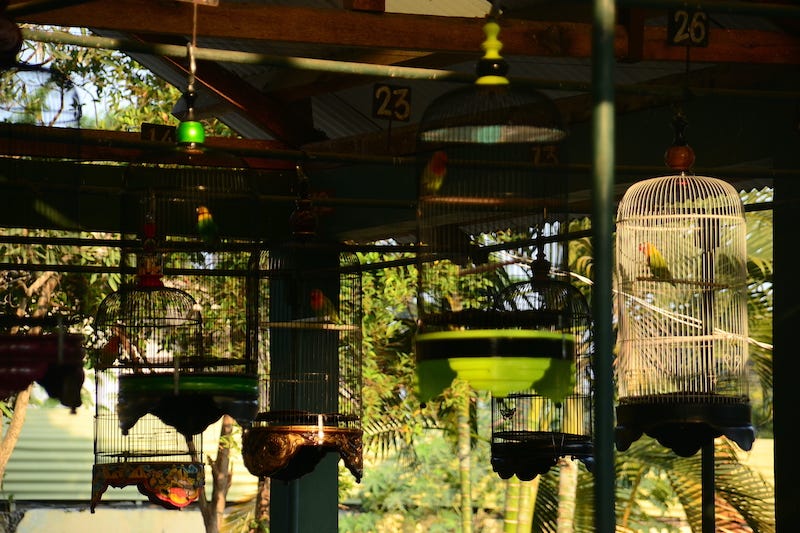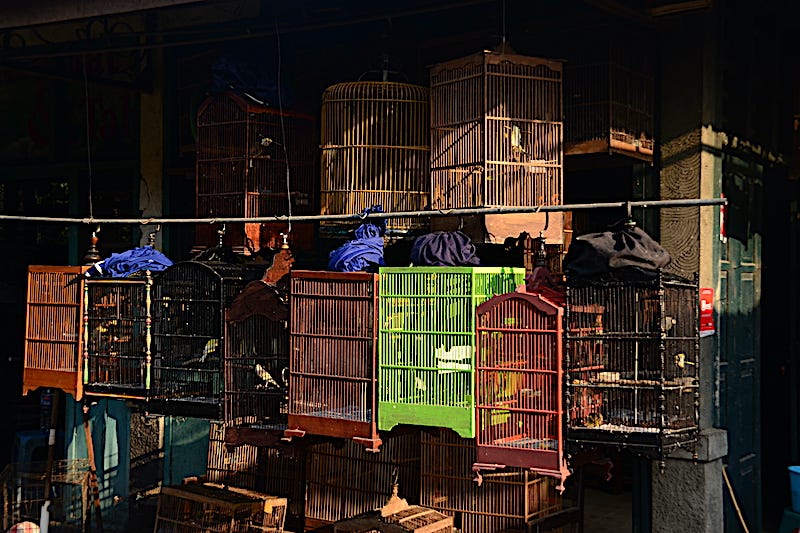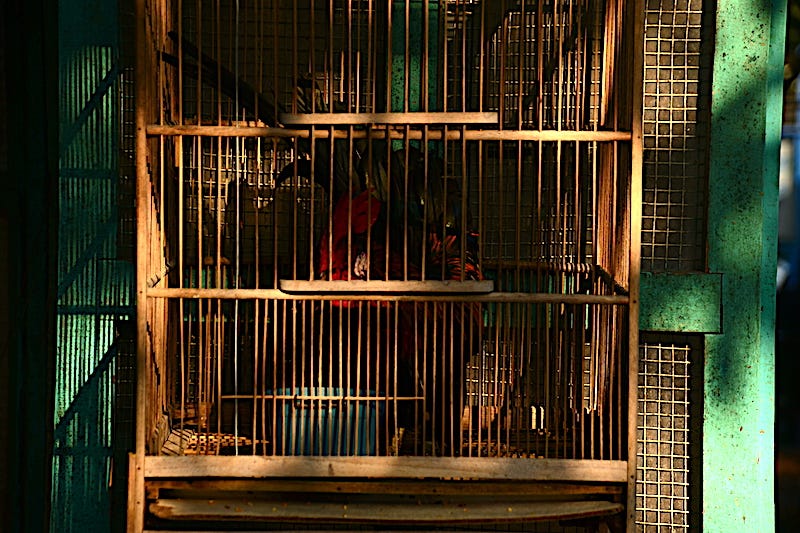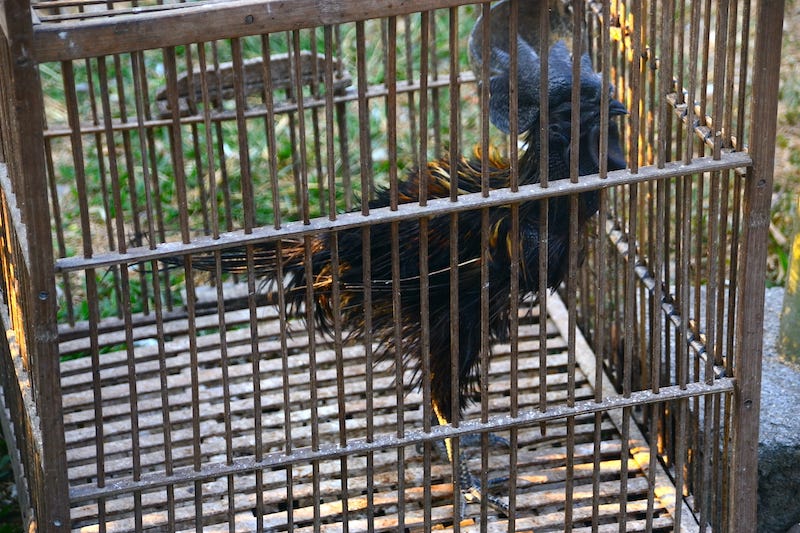The music is by:
Eje Eje from Tel Aviw, Israel,
Féloche, a French musician, singer and singer-songwriter,
Dominique Pereira Pinto, known by her stage name Dom La Nena, a Brazilian cellist, singer and songwriter.
I have now left the Sumatran leg of the journey, because most of the stuff from Sumatra and West Java was already published in random posts last year. There is only East Java left, so today comes the first post from Indonesia’s most iconic city: Yogyakarta.
Yogyakarta is located in the south-central part of the island of Java. As the only Indonesian royal city still ruled by a monarchy, Yogyakarta is regarded as an important centre for classical Javanese fine arts and culture such as ballet, batik textiles, drama, literature, music, poetry, silversmithing, visual arts, and wayang puppetry (Wikipedia).
From the terrace of my hostel, I have a full worm’s-eye view of each morning arrival at Adisutjipto International Airport.
Sipping my coffee, I watch the underbellies of low-flying planes drift overhead, my thoughts wandering back to yesterday’s visit to Pasty Love Bird Market—a bustling haven for fiercely competitive, intensely passionate, homegrown ornithologists***.
Since lunchtime, songbird competitions had filled the air with lively melodies, while racing pigeons showcased their precise, return-on-cue skills. Then, around 3 p.m., a surge of intense emotions began to ripple through the crowd of local ornithologists, each one eager and tense as they prepared their prized parakeets for the day’s grand finale—a singing contest.
Years ago, I’d first encountered the fierce passion Indonesians have for watching birds sing, spar, or simply flaunt their plumage. But I had no idea this was something of a national sport, charged with a hysteria rivaling a Champions League final—all ignited by the sight of vibrant feathers and elegant forms confined within cages.
Judges roamed the area with pens and clipboards, theirfaces fixed in serious concentration, while frantic owners cheered on their caged, feathered gems suspended from the ceiling. They shouted as if their voices alone could somehow make the poor birds—and their pretty songs—even more enchanting than they already were!
To the left, a swarm of high-stakes gamblers matched the owners’ level of hysteria, their rupiahs riding on their chosen favorites. They leaned in, eager to sway the judges’ stone-faced impartiality, each cheer a subtle attempt to tip the scales in their favour.
After a storm of boos, hoots, and hisses from the riled-up homini excitati masculini, punctuated by the meek tweets and occasional rage-filled squawks of 42 parakeets, the moment of truth finally arrived. Silence fell, broken only by the sound of sweat rolling down tense foreheads.
Then the verdict was announced: thirty-nine ornithologists would ride away on their mopeds, their cages empty and hearts heavy. Bird number twenty-two would depart draped in a black cloth, a gold medal glinting from its beak, while number twelve would claim the silver. As for the bronze—well, I didn’t really register who got it. There was too much racket already.
My Nikon was struggling, caught in a frustrating dance as the poor birds flitted in and out of focus. The mesh, bars, and wires separating their vibrant plumage from my lens felt like an insurmountable barrier. Why can’t you admit it, you competitive ornithologists, serious judges, and fervent onlookers? Your beloved birds would shine so much brighter against a backdrop of lush green leaves in the wild—without those confining bars. And surely, they'd sing sweeter melodies, too.
On my way out, my Nikon made another attempt to connect with the desperate greetings from my compatriot, Polish crested chicken (ayam jambul) and then from an odd chicken with reversed-growing feathers (pitik walik).
But they both kept slipping in and out of focus, as if ashamed to be captured and caged in photo albums under such unflattering circumstances.
* Silbo Javanaise (Javan Whistle) is my own modification of Silbo Gomero (Gomeran Whistle), also known as el silbo ("the whistle"). It is a whistled register of Spanish used by inhabitants of La Gomera in the Canary Islands, historically used to communicate across the deep ravines and narrow valleys that radiate through the island. It enabled messages to be exchanged over a distance of up to five kilometres. Due to its loudness, Silbo Gomero is generally used for public communication. Messages conveyed range from event invitations to public information advisories. A speaker of Silbo Gomero is sometimes called a silbador ("whistler") (Wikipedia).
I have butchered the pretty song by Féloche in the singing competition video, so I would like to play the original here:
** The subtitle paraphrases the title of James Herriot’s series of books based on his experiences as a veterinary surgeon: All Creatures Great and Small.
*** Bird keeping is a deeply ingrained part of Indonesian culture, especially in Java where owning songbirds is considered part of a well-balanced life. According to a paper published in the international journal Biological Conservation, a third of Java’s 36 million households keep up to 84 million caged birds, and the hobby has been increasingly popularised by singing contests. These contests are known locally as Kicau-mania (‘kikcau’ is Indonesian for ‘chirping’), and feature caged birds being judged on the volume and quality of their songs, with thousands of pounds in prize money up for grabs.
Held every two years in Indonesia’s largest sports stadium and attended by 8,000 people, the President’s Cup is one of the most prestigious of these contests. Indonesia’s current president Joko Widodo is an avid competitor to the extent that when his own bird lost the contest in 2018, he offered 600 million rupiah (£30,000) to buy the winner from its owner. Read on in: https://elephant-family.org/news-views/news/a-bird-in-the-hand-and-none-in-the-bush/
More about wild birds’ fate in Indonesia from Daily Mail:
'No room to open their wings': Wild birds with brilliant plumage are a status symbol in Indonesia, where a rapacious trade has left many on the verge of extinction. Now you can join the fight to save them
This is a sight to break any bird-lover’s heart. In the crowded street markets of Indonesia, myriad wild birds with brilliant plumage are displayed for sale, in tiny cages without room even to open their wings.
Captured from the forests across these islands in their tens of millions, they are sold for as little as £1 in a trade so rapacious and ruthless that numerous species are on the verge of extinction.
Many die before they are even sold. Survivors are paraded as trophies and traded as part of the growing obsession with lucrative songbird competitions — a craze known as kicau-mania — where only the loudest and most mellifluous birds are prized.
The practice is so endemic that on one Indonesian island, Java, there are at least 75 million ‘ornamental’ birds (those, whether they sing or not, which are bound for people’s homes) in captivity — more than are thought to remain in the wild on the island, according to research by Chester Zoo and Manchester Metropolitan University… Read on in: https://www.dailymail.co.uk/debate/article-11773995/No-room-open-wings-Wild-birds-brilliant-plumage-status-symbol-Indonesia.html
About the landing plane video:
The footage is not from Yogyakarta but from Changi Beach in Singapore. Planes really show their underbellies all along the Hight Street of Yogya, but they fly past at a slightly higher altitude. The fragment that accompanies the video comes from a song by Eje Eje. Here is the whole thing:
I chose this piece of music:
a) because I like it.
b) because of its title. It was really the closest I had ever got to a flying plane, even though it is nothing compared to this:
There will be more from Yogyakarta next week. And remember my dear subscriber that whatever’s been published before, can be found in the archives. Also, if you can’t find my post on Monday next week, well… it will mean that I have gone to do the next thing that is making me tick at that moment I time….





